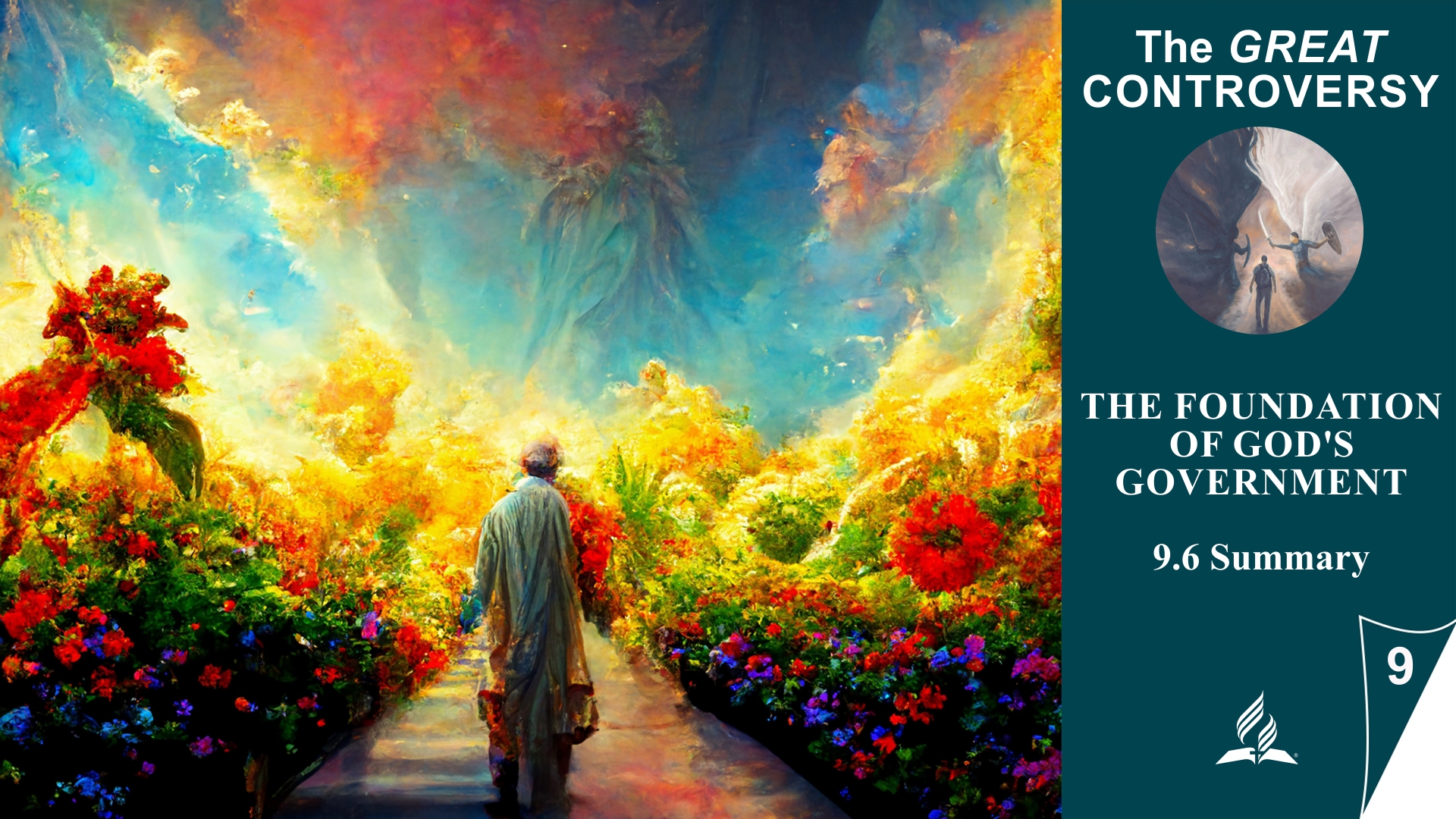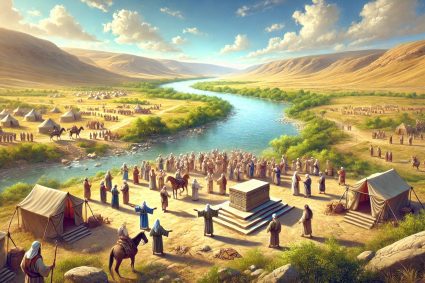


9.6 Summary
A Look at Law, Sabbath, and End-Time Conflict
Lesson 9 explores the foundation of God’s government, particularly through examining the three angels’ messages in Revelation 14. These messages call people to decide between worshiping the Creator and worshiping the beast. The first angel reminds us that God’s hour of judgment has come and calls for true worship of God. The second angel warns of Babylon, a symbol of fallen religious systems that lead to false worship. The essence of the decision lies in faithfulness to God by keeping His commandments and faith in Jesus Christ. This decision impacts not only spiritual life but also everyday life and values. Through obedience, trust, and strengthening of faith, God prepares believers for future challenges by guiding them through trials, instructing them in His Word, providing fellowship with other believers, and strengthening them with personal experiences of His faithfulness.

The connection between Lesson 9 and our daily life and faith is fundamental. The lesson emphasizes the choice between worshiping the Creator and worshiping false gods or systems. This decision is not only theological but also affects our daily actions and beliefs.
In everyday life, our faithfulness to the Creator is shown through our behavior and decisions. By keeping His commandments and obeying His Word, we express our faith and devotion. The Sabbath, as a sign of worshiping the Creator, can permeate our daily life by consciously setting aside time for rest, worship, and fellowship with God and other believers.
Our faith in Jesus Christ also influences our daily decisions and relationships. It enables us to show love and forgiveness to others, even when it’s difficult, and to rely on God’s promises when faced with challenges. Faith in Jesus gives us the strength to remain steadfast in difficult times and to share the hope we have found in Him with others.
Overall, the connection between Lesson 9, our daily life, and our faith is inseparable. Our decisions, beliefs, and actions in everyday life should be guided by our faith in the Creator and our Lord Jesus Christ. By understanding and living this connection, we can lead a life that honors God and aligns with His will.
Reflecting on the Sabbath issue reminds us that truth often stands in contrast to the majority, and understanding Holy Scripture is our most important source of knowledge.

1.The world is changing so quickly and dramatically. Why must we always be vigilant so that end-time events do not catch us unprepared?
We must always be vigilant so that end-time events do not catch us unprepared because the world is changing so quickly and dramatically. In a time when technological advancements and societal changes are progressing rapidly, we can easily be distracted from the fundamental values and principles rooted in Holy Scripture. Without vigilance, we risk losing sight of the signs of the times and succumbing to the temptations of a fast-paced, human-centered world. Only through vigilance can we strengthen our faith, prepare for upcoming challenges, and remain faithful to God’s guidelines in a changing world.
2.How can the understanding of God’s judgment and law be reconciled with the fact that we are saved by grace alone?
The understanding of God’s judgment and law can be easily reconciled with the fact that we are saved by grace alone. God’s grace does not mean that the law is abolished or that judgment has no place. Rather, grace, law, and judgment complement each other in God’s plan of salvation.
God’s law serves as a standard of righteousness and shows us the way of obedience to God and love for our fellow human beings. It reveals God’s character and His holy principles. However, since we are all sinners and have broken the law, we cannot stand before God through our own works.
This is where grace comes into play. Through Jesus Christ’s sacrifice on the cross, we have the opportunity to receive forgiveness of our sins and be saved by faith in Him. This grace is an undeserved gift from God, granting us salvation that we cannot earn on our own.
God’s judgment is part of His righteous plan to hold people accountable and judge evil. It will reveal who has accepted God’s grace through faith in Christ and who has deliberately turned away from Him. Judgment will not only condemn the guilty but also reward the faithful and bring them into fellowship with God.
In summary, the Bible shows that grace, law, and judgment are inseparable and work together to fulfill God’s plan of salvation for humanity.
3.How can you bear witness to those who do not understand the significance of the true Sabbath and seriously observe Sunday, the first day of the week?
To bear witness to those who do not understand the significance of the true Sabbath and observe Sunday, you can approach this in several ways:
-
Biblical Foundations: Explain the biblical principles and texts that highlight the Sabbath as the God-ordained day of rest, such as the Ten Commandments in Exodus 20:8-11.
-
Historical Background: Share information about the development of Sunday observance in the history of Christianity and emphasize the difference between God’s command and human traditions.
-
Personal Testimonies: Share personal experiences and testimonies about how observing the Sabbath has strengthened your faith and deepened your relationship with God.
-
Loving Explanation: Be patient and loving in your explanations, and approach those who observe Sunday with respect and understanding for their beliefs.
-
Living Example: Live out your faith consistently and show through your life how observing the Sabbath influences your values and priorities.
-
Prayer: Ask God for wisdom and guidance to open people’s hearts and make them receptive to the truth about the Sabbath.
By bearing a loving, respectful, and authentic witness, you can help people understand the significance of the true Sabbath and seriously consider how they want to honor God in their worship.

4.What danger lies in the union of church and state powers? How should we as Christians relate to the government?
The union of church and state powers poses the danger of restricting religious freedom and violating freedom of conscience. When religious authorities are closely linked with state institutions, there is a possibility that religious beliefs will be enforced and people will be forced to act against their conscience.
As Christians, we should relate to the government in a manner guided by biblical principles:
-
Prayer: We should pray for our leaders to make wise decisions and promote the common good.
-
Submission: According to the Bible, we should submit to governmental authorities as long as their requirements do not contradict God’s commandments (Romans 13:1-7).
-
Conscientious Citizenship: As citizens, we have a responsibility to engage in our government, advocate for justice and freedom, and work for the welfare of our fellow human beings.
-
Separation of Church and State: We should advocate for the separation of church and state to preserve religious freedom and ensure that no religion is favored or disadvantaged.
-
Bearing Witness: We should bear witness to Christ and His truth in all areas of our lives, including our political beliefs, and work for a society based on the principles of love, justice, and mercy.
By following these principles, we can contribute as Christians to ensuring that governments act justly and respect religious freedom, promoting a society based on the values of God’s kingdom.
(Visited 21 times, 1 visits today)
























